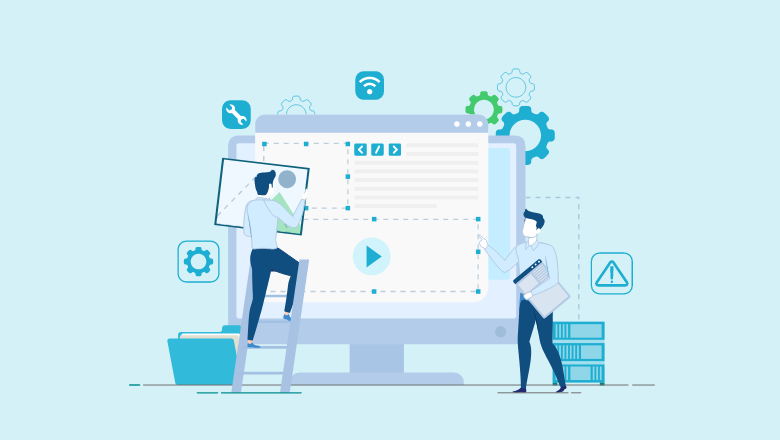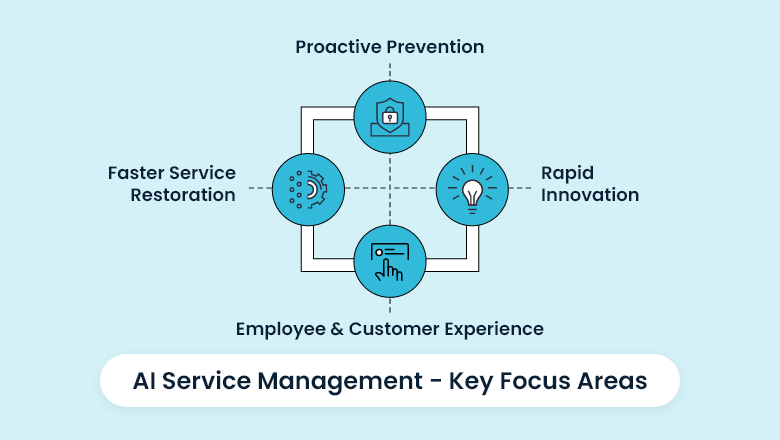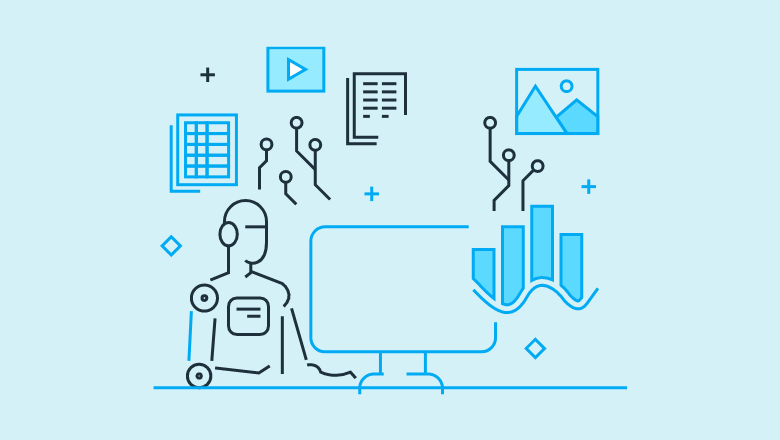
To modernize how organizations do business worldwide, they are adopting AI along with digital technologies.
By doing so, companies strive to enhance productivity and efficiency and innovate new customer and employee experiences that will improve competitiveness.
Organizations and their leaders must adopt a transformational and holistic mindset to succeed.
They need a digital transformation that solves customer experience for multiple service queries. As part of their digital transformation, many organizations are leveraging tools like an AI website generator to streamline and personalize their online presence, providing enhanced customer and employee experiences.
In addition, businesses use a different lens to imagine new ways to assemble and increase value at a discrete functional level and across the entire value chain along with cross-functional processes.
Automation for Service Desk
A self-service-based helpdesk automation platform will allow the business to get the same outcomes as it is done by humans but in the blink of an eye.
With no human intervention for service delivery, human labor cost is deducted, reduced transaction costs are almost zero, and the capacity for human error is drastically reduced.
As a result, AI can create precise, fast, and increasingly efficient outcomes with context over time that set the foundation ahead in the IT customer experience.
Service incidents can be blotted and solved effectively before employees know. AI and automation are effective enablers to provide services and support for business operations.
AI for Service Desk
Automation and AI help you access and maximize the customer service touch points and reduce manual intervention.
AI-enabled ITSM is a possibility for business to perform their best service—free of the ordinary task.
As a result, enterprises are executing AI with the help of ai code assistant, and businesses are growing where automation use cases are the center of action in service desks worldwide.
In addition, customers are using AI-based service portals to convert the experience while businesses improve the overall performance through AI and transforming IT services.
Digital transformation isn’t a new concept, but with Automation in the Service Desk platform, it’s an aspirational goal for every business.
The power to operationalize and rapidly expand digital transformation has become a competitive baseline requirement for every enterprise.
That means providing consumer-grade experiences for employees and customers alike with ease of use, reliability, and performance.
AI can help businesses win the battle for customer experience in 2024 and beyond, as tools such as the AI image generator enhance visual communication and engagement while an AI clip generator transforms static content into dynamic, persuasive narratives.
- Realizing Significant Cost Savings
- Reduce Average Ticket Handling Time
- Deliver Improved Personalization
- Enhance Agent Experience
- Build a Stronger Brand Image
Automation and AI use cases
Businesses are often affected the most whenever there is a transformation in technology, and as a result, companies go through a whirlpool of changes.
The Gartner recent study report remarked that “AI will be among the top five investment preferences for more than 30% of CIOs”.
Leaders have quickly realized that customer experience is the new battleground for brands looking to stay relevant in a competitive and data-driven world.
1. Intelligent Ticket Handling
Identify and capture issues from Multiple Channels, help organizations provide support across multiple channels, lower response & resolution times, promote self-service, and thus enhance customer satisfaction.
A robust ticketing system would enable managers to schedule reports to their inboxes regularly.
- Save time with automation
- Powerful no code and dynamic multi-level workflow automation.
- Automation usage increases efficiency by providing predefined answers and canned responses through a virtual agent, automated ticket allocation by an AI-based algorithm, and more.
- Automation helps resolve tickets based on priority.
2. Virtual Service Agents (VSAs) by AI Chatbots
When business thinks of AI, voice assistance is the first thing that pops up in our minds.
Integrating text to speech functionalities within virtual service agents by AI Chatbots revolutionizes user experiences, enabling seamless, natural-sounding conversations that bridge the gap between human and machine interaction.
Using a chatbot’s assistance facility and voice assistance is not new, but the question is how to make AI chatbots helpful in an ITSM product?
The answer is that business needs to move beyond gadgets.
For example, simple queries such as “How many open tickets are there?” are useless when almost all top ITSM tools have powerful dashboards.
Instead, we can take more useful use cases such as:
IT Technician 1: “I need to know the average resolution time for Alexander for the last three months.”
Virtual Assistant: “The average resolution time for Alexander is two days.”
IT Technician 2: “Give me a list of all desktop assets with the software Adobe Photoshop.”
Virtual Assistant: “A pdf report has been added to your download folder.”
The benefits of such a capability include:
- Faster ticket resolution,
- Create reports from search queries,
- Technicians can access the available data.
3. SLAs and Escalation
Resolve tickets promptly based on priority, get notified of SLA breaches, and measure SLA performance using SLA Management.
- Businesses will have multiple SLA policies and escalation criteria.
- Auto-escalate tickets and notify key stakeholders on SLA violations with pre-defined automation rules.
- Measure SLA performance using compliance reports.
Machine learning-enabled ITSM tools can teach how technicians are resolving issues. It can learn about patterns that are often recurring; based on this; it can suggest workflows, keeping in mind the possibilities.
This will allow the IT admin to progressively streamline IT services.
4. Integration with AIOps
AIOps & Integration Conference Experience brings predictive problem solving to the forefront to automate the work of integration, deliver analytical insights, and more.
Artificial Intelligence for IT Operations (AIOps) will profoundly impact how IT Services are delivered and managed.
When implemented successfully, the rewards for the business are considerable:
- Getting the right information automatically at the right time when addressing issues.
- Addressing prioritized bottlenecks instead of hunting bottlenecks.
Implementing AIOps will present new challenges in various domains, even with the Best Domain Registrars. including collecting and transforming the data.
From monitoring and event management to analyzing this through AI and Machine Learning, AIOps help set up automation and develop man-machine interfaces and tooling.
5. AI-based Suggestions for Reports
Many consider executing recommendation algorithms too difficult and requires a global restructuring of collecting and processing data and changes in business processes.
However, AI-based suggestion systems apply to almost every business. Often, the data that is already collected is enough to start recommending.
To transform your business with
AI and Automation-based
Service Desk
6. Trend Identification and Decision Support
AI decision-making allows enterprises to develop faster, more accurate, and more consistent decisions by analyzing the datasets with AI.
With Automation and Artificial intelligence, analyzing large datasets without error is huge decision-making support for the organization.
And as a result, AI automation will help business teams to focus better on work relevant to their field. In addition, machine learning-enabled ITSM tools help learn how technicians resolve issues.
By keeping in mind, the possibilities, it can learn about recurring patterns and be able to suggest workflows. It will allow the IT admin to progressively streamline IT services.
Conversational AI has pushed automated technology higher and provided employees with a system they can talk to.
In customer service, classifying support tickets by topic, sentiment, urgency, and language is the most popular approach, and Motadata ServiceOps offers ticket classification models for all.
7. AI-Assisted Problem & Knowledge Management
Distributing knowledge throughout the organization is a prerequisite to applying it effectively in problem-solving and decision-making.
However, knowledge sharing is often plagued by temporal, spatial, and, more evidently, functional barriers.
One of the key challenges of knowledge sharing is overcoming silos to connect disparate people with the practices and knowledge they need.
AI approaches can avenge this by discovering and strengthening weak links, thus facilitating community-based learning.
The implementation of AI-based knowledge management systems has a lot of notable benefits, such as:
- Reduced support cost
- Streamlined technical process using remote support
- Better customer service and CMX
- Customer satisfaction and retention
Business Transformation with Automation and AI
In this era of artificial intelligence, organizations must keep up with industry technology and innovations to offer the best customer service and experience.
With little time spent on tedious and repetitive tasks, service desk technicians can focus on priority tasks and challenges that require creative solutions and human problem-solving.
Motadata Service Desk is the best platform for your technician to do the best work—free of the usual, to do the priority work they joined your organization.
With the development of tools like artificial intelligence, augmented reality has increased.
The AI-based knowledge management systems have helped bring the organizations close to their customers by making it much simpler.






